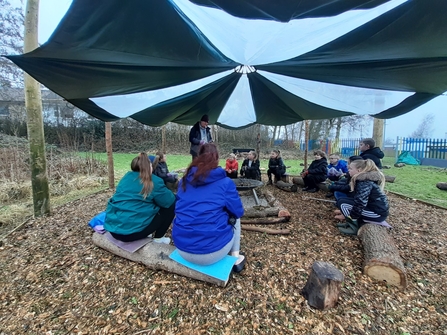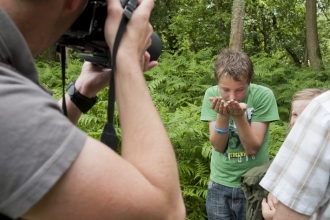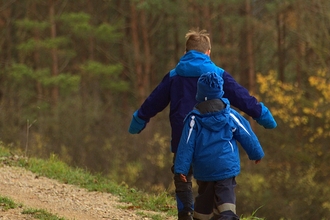Almost 30,000 children from disadvantaged areas are set to enjoy classes in nature this spring in a ground-breaking outdoor learning project spearheaded by The Wildlife Trusts. Nature Friendly Schools gives children from some of the poorest communities in the country opportunities to learn outside the classroom, while supporting their wellbeing, mental health, and engagement with school.

Ryecroft Academy
Imagine maths next to a wildlife pond in the inner city, English under the shade of an ancient oak, or science classes through real life experiences in the natural world...
The project is entering a new phase at a critical time; after a year when children have been isolated from the natural world, learnt behind screens, and suffered a substantial rise in mental health issues.[i] Children from disadvantaged backgrounds are known to have been disproportionately affected by the pandemic, especially in terms of access to green space.[ii]
Nature Friendly Schools gives those pupils a lifeline to spend some of their day learning outdoors, encouraging motivation, confidence, and creativity.
Craig Bennett, Chief Executive of The Wildlife Trusts, says:
“Learning in nature boosts children’s well-being, confidence, and behaviour, and should be a fundamental part of a child’s experience in education. We’re delighted at the success of the project so far.
“We know that children in deprived areas are much less likely to have contact with nature while the pandemic also increased screen-based learning. The new phase of Nature Friendly Schools is more important than ever for them.
“In spite of its proven success, the Nature Friendly Schools initiative is not guaranteed to see out its final year. We believe the need for this project has never been greater and it is vital it continues so we can give more children opportunities to learn, play and get creative in wild, green spaces.”
Now needed more than ever, the project, funded by Defra and the Department for Education - and supported by Natural England, is increasing its reach this year. Nature Friendly Schools aims to work with more than 100 schools – in areas of the highest levels of social deprivation – and give almost 30,000 pupils opportunities to learn and play in nature as part of their education recovery.
Despite disruptions to education over the last year, the project has already worked in 90 schools, enabling 16,000 pupils to benefit from learning in nature, training 500 teachers in outdoor learning and supporting pupil’s mental health – and transforming 30 school grounds.
Through expert training, Nature Friendly Schools empowers teachers to deliver outdoor classes independently, helping them overcome barriers that made it challenging to head out into nature before. This includes making the most of limited outside space, managing behaviour outdoors, and helping teachers measure learning outside of a conventional classroom. Nature Friendly Schools also rewilds school grounds, creating outdoor classrooms and greener, more natural spaces around school buildings.
The project was initially planned to run over four years, benefitting over 100,000 primary and secondary ages pupils. With funding not guaranteed for the final year, up to 46,000 pupils are expected to take part.
Research from The Wildlife Trusts and UCL shows that spending time in nature has a hugely positive impact on children’s health and well-being. Their Nature Nurtures Children study revealed the educational, social and wellbeing benefits of outdoor learning.
After taking part in Wildlife Trust-led activities:
Nature Friendly Schools brings together a unique partnership which includes:
The Wildlife Trusts - leading providers of outdoor nature education
YoungMinds - leading the movement to make sure every young person gets the mental health support they need, when they need it, no matter what
Groundwork – transforming young lives in the most disadvantaged communities
Sensory Trust - experts in ensuring children with special needs enjoy access to nature
Field Studies Council - inspiring environmental education through residential courses
Deirdre Kehoe, Director of Training and Services at YoungMinds says, “We’re proud to be part of the Nature Friendly Schools partnership, a vital project giving children and young people outdoor learning opportunities. We know that many children and young people have struggled with their mental health as a result of the coronavirus pandemic and that those who were already impacted by inequalities are likely to be most affected. Now more than ever, they need the space to process what they have been through in an environment that is supportive for their mental health as well as their learning.”
Stephanie Dowley, Headteacher at John Randall Primary in Telford, says, “Nature Friendly Schools has been transformative for our pupils and our school. Every class now spends at least an hour learning outside each day in our forest school area, which is brilliant for the children. Their senses come alive, encouraging creativity and confidence. After the year children have had – much of the time being stuck at home and away from their peers – learning and playing together in nature isn’t just helpful – it’s essential.”
Kim Leathy, Teacher at Westminster Academy in Blackpool, says, “Nature Friendly Schools has been so beneficial for our pupils and our school. Many children come into school with different anxieties, but when they’re learning outside, they are present in the moment, and their worries just seem to fade away. Being outdoors also works wonders for their creativity and enthusiasm for learning – and improves behaviour as well. Learning in nature has become a keystone part of their education.”
The Wildlife Trusts are hosting an online discussion about the importance of nature in education on 31st March. The panel includes Wildlife Trusts Ambassador Dr Amir Khan, education campaigner Joe Brindle, and Bobbi Benjamin-Wand from London Wildlife Trust.





